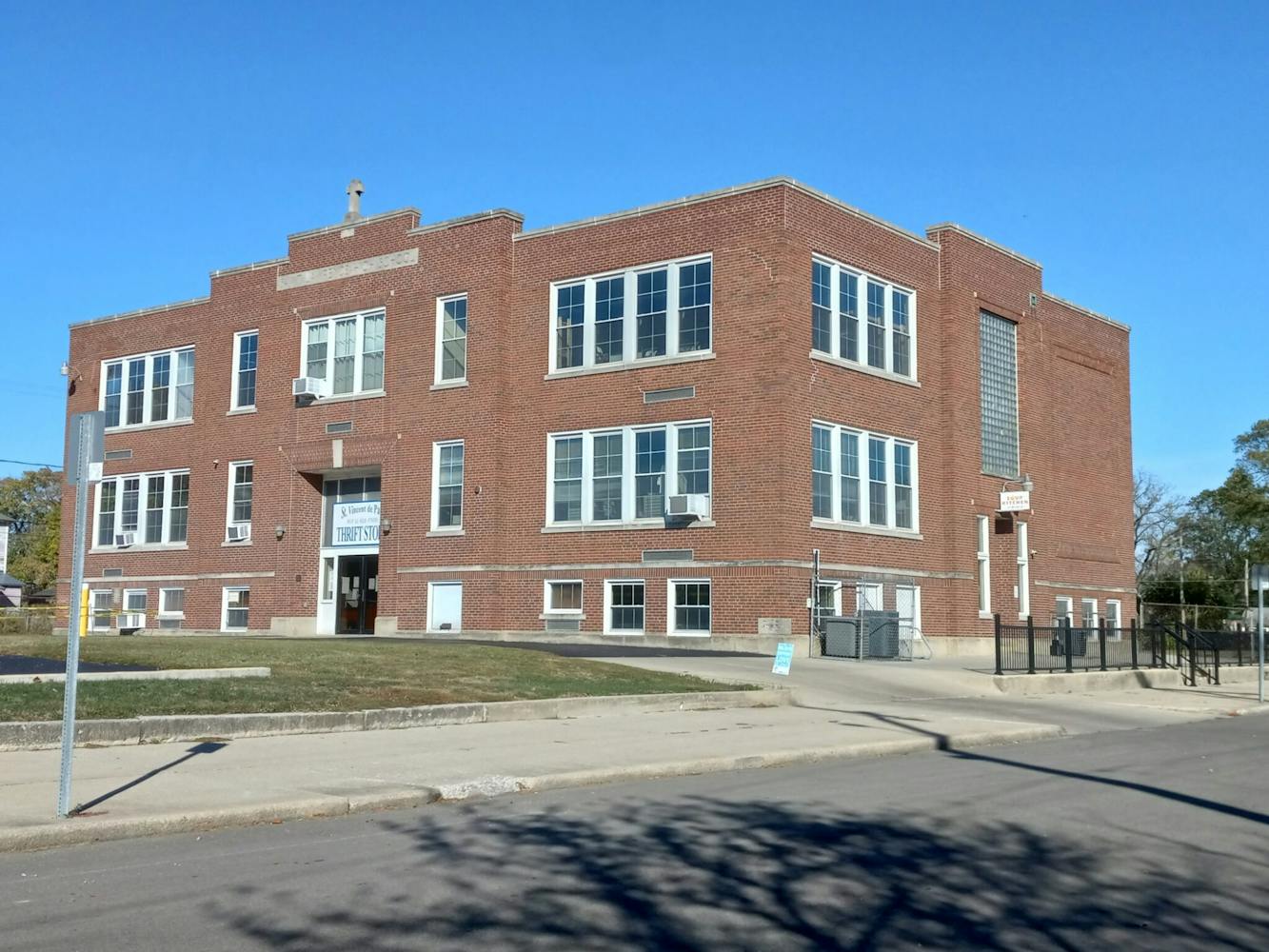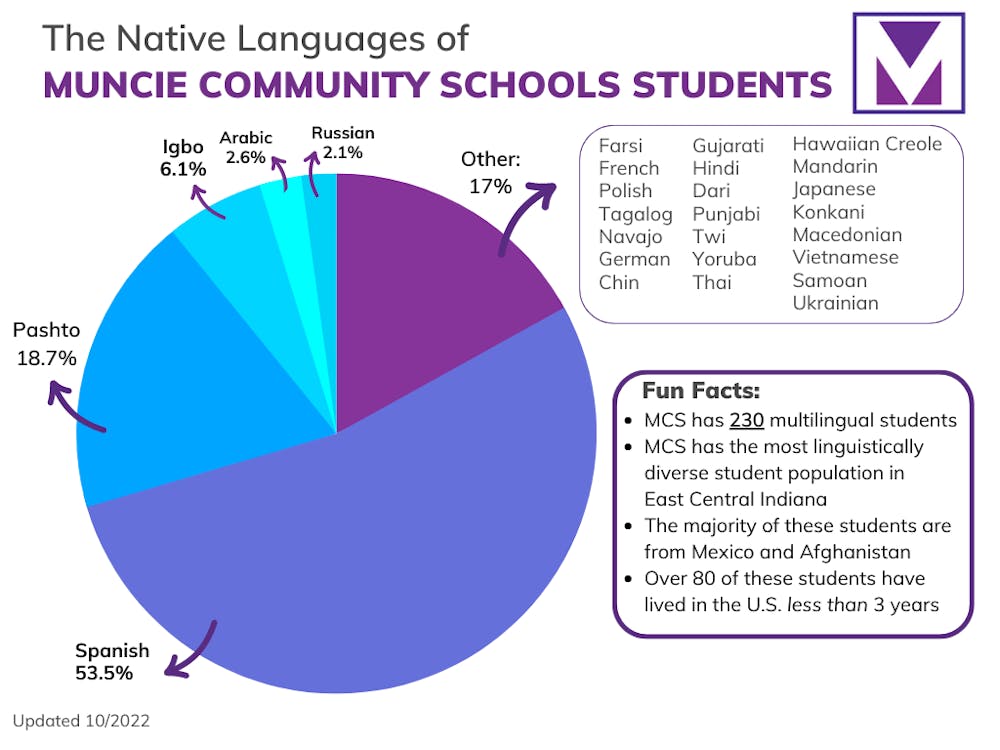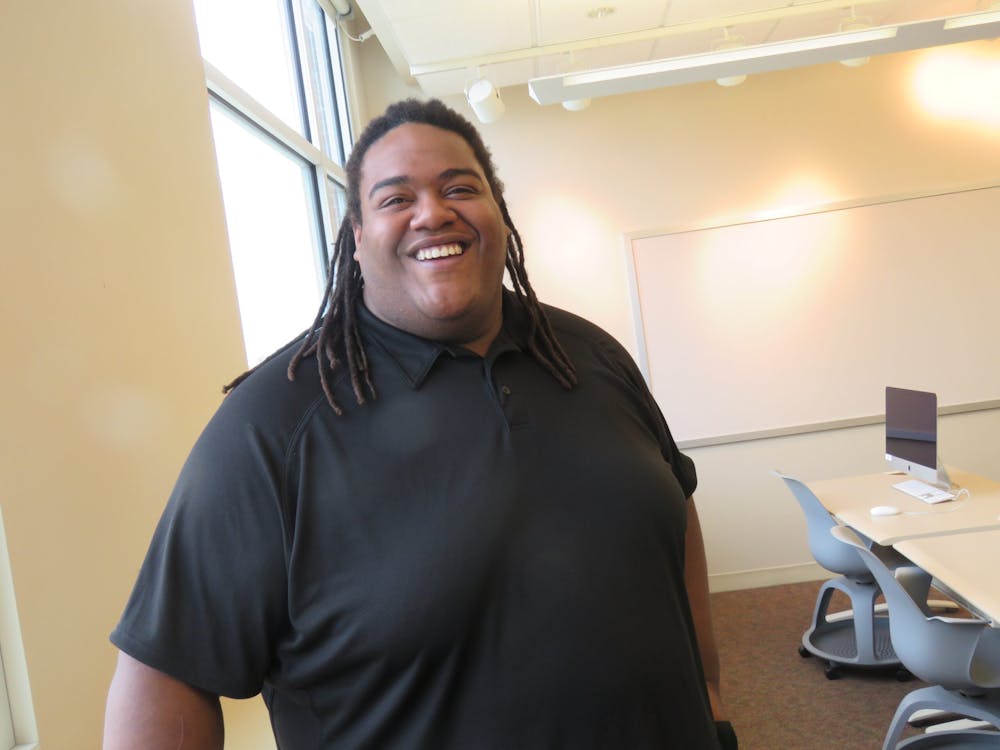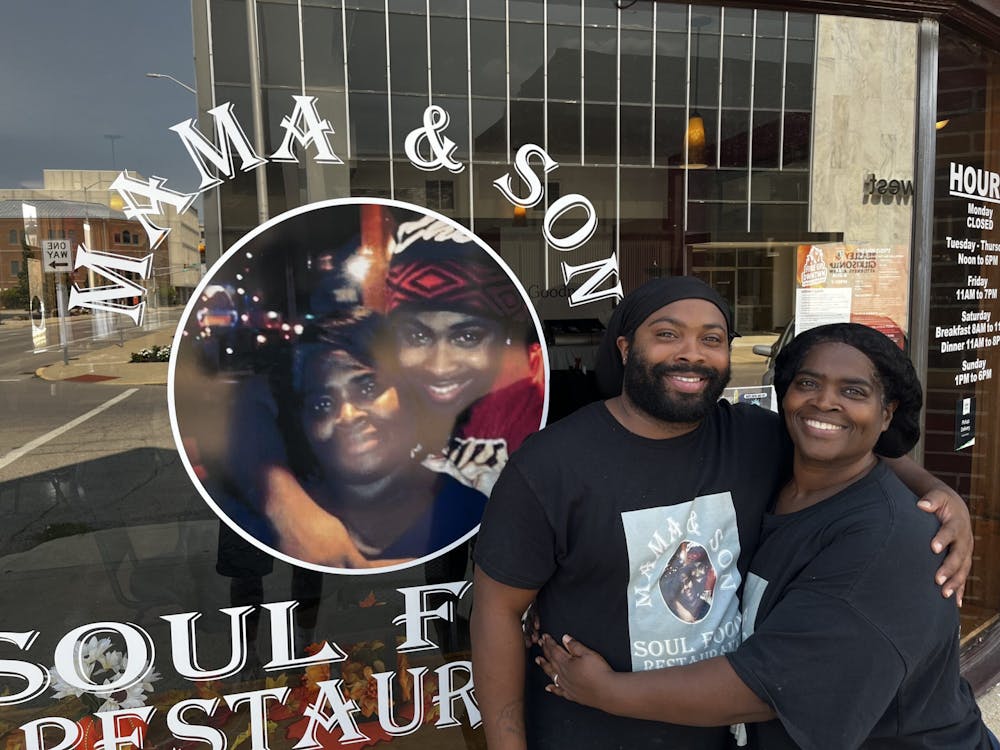Story by Zeke Hansen / Inform Muncie
Editor's Note: This story was originally published in October, 2022.
In 2017, Marsh Supermarkets, a retail food chain that at one point had 86 different stores between Ohio and Indiana, filed for bankruptcy. The company announced that the remaining 44 stores, five of which were in Muncie, Ind., would be open for purchase. Only two of Muncie’s five stores would be bought out, however. Kroger Co. picked up the old Marsh Supermarkets on Wheeling, on the northwest side of Muncie, and on Tillotson, on the west-central side of Muncie.
Those two sites were converted into Pay Less Super Markets. The remaining three sites went unsold. One of those three stores has been unused in the time since then. A large faded Marsh logo lurks above its entrance as you drive on Walnut Street north of downtown Muncie. The second of the three stores was located next to Hoyt Avenue, on the southwest part of the city. It was eventually converted into a climate-controlled storage unit that looks as if it too is abandoned. The third un-purchased store was located in the southeast part of the city next to Burlington Drive. The property for it was recently bought and is now making way for a series of apartment complexes.
When driving between those three locations, a drive that spans nearly 10 miles and uses many of the busiest streets in Muncie, two things become apparent: 1. the neighborhoods and streets you drive through are obviously of less prosperous than the ones you drive through between the two Pay Less Super Markets, and 2. there are no other supermarkets in sight on that drive.
The closest thing you’ll find to a supermarket is a Family Dollar, located next to the old Marsh Supermarket on Walnut Street, and a Dollar General, located on Memorial Drive. The 2017 disappearance of Marsh Supermarkets furthered what was already a major problem for Muncie and its residents: food deserts.
The term food desert refers to a geographical area that is determined to be of low income and where residents have to go so long before they can find a place to get food. For many people, access to a car negates any of the concerns that come from being so many miles away from a grocery store, but for those in low-income households, that might be a luxury.
Loretta Parsons, Executive Director for the Soup Kitchen of Muncie, remembers what it was like when those Marsh Supermarkets closed down.
“Suddenly, people don’t know where to go to get food, and if they could walk to the grocery store before, now they can’t, so they have to get on a bus,” she said. “Well, the bus only let them bring so many sacks of groceries back on the bus, and of course that whole process takes a lot longer than, you know, just going down to the grocery store, so we are smack dab in the middle of a food desert, and these grocery stores are gone.”
The Soup Kitchen has provided free of charge, daily meals for those without access to groceries for 28 years. Out of Parsons’ 11 years as Executive Director, she considers the Summer of 2017 as one of the most challenging times for the organization.
“Suddenly, our numbers started going up again, and it was in the middle of the Summer. It was July, August, something around there. For eight straight days, we served over 200 people a day, and I look back on that and I wonder, ‘how on Earth did we do that?’ and we did, and people were just in a loss. They had to change the whole way they could proceed to get food.”
In the five years since Marsh Supermarkets declared bankruptcy, not much has changed. A single Walmart and a single Aldi’s are still the only two grocery stores for those outside of the northwest section of the city. The prolonged absence of supermarkets looks especially worse when you consider the Marsh Supermarkets in Muncie that were bought and taken up.
“It was sad to me that Payless came, but where did they come? Over on the northwest side of the city,” Parsons said. “Nothing came here in the food desert. Nothing. Just Walmart and Aldi’s continue to provide food, and there was no grocery store put over here on this side of town, and I just, to this day, don’t understand why something wasn’t done to, you know, bring a grocery store to the food desert. It just makes no sense to me.”
Parsons has lived in Muncie for most of her life. Born in Winchester, Indiana, her family moved to Muncie when she was 2. She attended Burris Laboratory School from Kindergarten through 12th grade. After a brief stint attending Ball State University, she married and moved with her husband to Albuquerque, New Mexico, where he was stationed with the army.
It was there where they had their first child, a girl, before moving back to Muncie a few years later. Shortly after having their second girl, the two divorced. To support her children, Parsons took a job with the Ball Corporation, working in a warehouse. After a short time in that job, she received the opportunity to be promoted to a management position after a coworker who had been approached about the management position recommended Parsons.
Ball Corporation, pressured by the government, was looking to put a woman into a management position, but as to who they would put in that position, there weren’t many options. Most of Ball Corporation’s employees were men.
“So here I am, 24 years old, and I’m supervising men who are in their 50s or 60s that have worked there 20, 25, 30 years,” Parsons recollected. “That didn’t go over real well, but for the most part, they were pretty respectful. But you can imagine, all of the sudden now there’s a woman in this position, and she’s young, and what does she know about a factory? And I was kinda asking myself those questions, too, but it was such an opportunity to learn and to move forward, to better myself and my girls at that point.”
It was in that position where she would meet her second husband, with whom they would have a son together in 1981. A couple of years later she was promoted to operations analyst, where she operated the man hours for each position and examined the efficiency of the plant. Several years later, she moved to the Ball Corporation offices to become the purchasing manager.
In 2002, her husband was diagnosed with cancer. He lived for 19 months before passing away in January of 2004. With the money provided from life insurance and a suitable early retirement plan from Ball Corporation, Parsons decided that she would be able to retire, so in the Summer of 2005, she retired at the age of 55.
Parsons first started volunteering with the Soup Kitchen in 2006. She was part of a group of people who were all single – one way or another — and were looking for ways to get involved in the community. Parsons came up with an idea that she would pitch to the Soup Kitchen of Muncie, which was then called Harvest Soup Kitchen.
“I got this idea that we could serve what I called a ‘Sunday Supper,’ and it would give us an activity to do as a group, and something on Sunday afternoon, because that can be a lonely time for someone that’s single. So, we would come on the last Sunday of the month, and we would fix a meal and serve it. We did it down here [at the Soup Kitchen] because folks are used to coming here, and they can get here, so that’s why we picked this.”
The “Sunday Supper” marked the start of Parsons’ time at the Soup Kitchen. She contributed purely as a volunteer until 2009 when the Soup Kitchen’s cook resigned to pursue a full-time position elsewhere. The then-executive director approached Parsons if she would take up being the cook, to which she agreed. Parsons worked as the cook for two years before the executive director resigned in 2011. The Soup Kitchen’s board approached Parsons about taking over the role she occupies to this day.
Parsons’ 16 years spent helping at the Soup Kitchen have been motivated by the thought of people in the city she’s lived in most of her life struggling because they don’t have easy access to food, whether because they don’t have the money or the grocery stores are too far away.
“It’s very meaningful to be able to work in your community and give back to your community. I think, when I first came down here and volunteered, the first day I was here and back on the line and opened the door and we saw a heap of people, I know I cried because it was just hard for me to believe that this need was so great in the community that I lived in.
“The thought of the Soup Kitchen helping people eat was on my heart, but to actually see it, and touch it and feel it, and see people that are worried about what they’re going to eat, and it’s not just men, it’s not just old people, it’s women and children. It just was kind of shocking, and I kinda knew that this was where I needed to be.”
Despite the thousands of meals provided, and despite the countless hours spent, Parsons has never once thought that she has put in more than she’s gotten out of the job.
“I believe that this is the best job I’ve ever had, I feel so blessed to have this opportunity, and like I said a while ago, you think you’re gonna be the blessing and you’re giving, but you get so much in return. At the end of the day, I got that feeling that, ‘I did something good today,’ and ‘this may be the only good thing I did.’”
That feeling has sustained her through the especially challenging times, like 2017, when Marsh Supermarkets closed down, as well as 2020, when the pandemic hit.
Due to the spread of COVID-19 and the ensuing quarantine in March of 2020, the Soup Kitchen was forced to shut down. In the following weeks, the question Parsons and her volunteers had to answer was: when would they start back up again? She knew that the Soup Kitchen couldn’t stay shut down for too long, because many people relied on the Soup Kitchen’s help. At the same time, starting up again produced a health risk on the part of Parsons and the volunteers as well as the people receiving the lunches.
Most if not all of the people getting their meals from the Soup Kitchen had a very low-income, and because of that, they did not have good access to healthcare, and most likely did not have consistent access to healthy foods. Taking that into consideration, health was a major concern for the people serviced by the Soup Kitchen.
Parsons, being at risk for severe symptoms from COVID-19 herself due to her diabetes and advanced age, wanted to make sure that when the Soup Kitchen did return, they would take as many precautions as possible.
It was only for six weeks that the Soup Kitchen was shut down completely, with Parsons trying her best to work from home and make plans for what they could do to be active again. Their neighbor, St. Lawrence Catholic Church, had a pantry that was serving meals two days a week, so after the initial six weeks, Parsons, the Soup Kitchen’s supervisor, and its kitchen manager helped prep sack lunches for that pantry.
It wasn’t until over a month later in mid-June that the Soup Kitchen itself opened back up by serving sack lunches. They would have to close their dining room due to the risk of COVID-19 spreading, shifting to carry out only, but now they were able to serve again. They provided sack lunches until a few months later in October, when they would start preparing hot meals again.
This is how the Soup Kitchen operates to this day, offering sack lunches and hot meals out the door Monday through Friday. The process of shutting down and then opening back up did cause a decrease in the number of people served, but slowly the Soup Kitchen was able to reconnect with people to get them the help they needed.
“Before the pandemic, we were probably doing about 140 to 150 a day, and then when the pandemic came, we did shut down for a while. Everything shut down,” Parsons said.
“Of course, the numbers went down because folks were trying to find stuff at other places, and there were a lot of things happening to get food to people in different places, but in early 2021, we started to see our numbers come back up again. Now, we are serving almost 160 a day, five days a week, out the door through carry out.”
Dealing with the pandemic and everything that came with it was not easy, however, and the toll of trying to keep a non-profit organization active while navigating that pandemic was eased for Parsons with the help of Heart of Indiana United Way (HIUW).
“I have to give [HIUW] a lot of credit,” Parsons said. “They got all of us not-for-profits together in sort of a partnership group, and we met by Zoom when the pandemic sort of shut everything down in March of 2020. We started meeting every week just trying to figure out what each of us needed and how we can help each other, and it really has strengthened our bond with each other in support and services. We know what each other is offering, so we share that and that’s been very beneficial as we’ve worked through this time of the pandemic.”
HIUW is a charter organization for United Way that serves five counties: Delaware, Fayette, Randolph, Henry, and Madison. It was only recently created in 2021 as a result of the merger between the pre-existing organizations of Madison County United Way and Delaware County United Way. Originally serving to provide funds for non-profits like the Soup Kitchen of Muncie, HIUW and United Way as a whole have had to change course over the last 20 years as the Internet has provided opportunities for organizations to raise funds without the help of HIUW.
Two of HIUW’s biggest initiatives of the last five years has been increasing third grade reading levels and meeting individuals where they’re at to help with their needs.
“In Delaware County, we really found that people wanted us to focus on education, and in Madison County they found that they really wanted to help support working individuals and families to help make ends meet,” Jim Flatford, director of community investments at HIUW, said. “With the merger, we’ve really been able to match those two focuses up.
“Our true focus is on those third-grade reading levels. That is when a student transitions from learning how to read to reading to learn, so your math problems become story problems, you start reading about Indiana history in fourth grade. If you’re not reading well, you could fall behind your peers, and it’s actually one of the biggest indicators of that student’s success in school and in life.”
The onset of COVID-19 in 2020 provided HIUW with the opportunity to go back to those roots of facilitating non-profit organizations to be able to service their communities.
“We realized quickly when COVID first hit… that we really needed to bring everybody together and help communicate and troubleshoot issues, so we started a weekly Zoom meeting,” Flatford said. “We probably had, at our highest, 95 or so people from organizations joining that weekly meeting, and we stayed weekly from that March until September, and the function of those meetings was… to just make sure everybody could share announcements, share what their needs were.”
“Those meetings really functioned both as kind of a support function, just for people to bounce ideas off of each other, and to see that everybody was going through this, and that kind of made people feel better. Some great collaborations came out of that.”
Parsons, eager to keep the Soup Kitchen functioning, took full advantage of the meetings.
“I’m glad Loretta remembers those fondly,” Flatford said, “because she was at every one of them.”
On a typical day, the first group of volunteers arrives at 7 a.m. at the Soup Kitchen’s base of operations just east of downtown Muncie. The Soup Kitchen operates out of what used to be an elementary school. The old brick building almost shapes up to be a perfect cube, but the width of the building is slightly longer than the length. A sign with the Soup Kitchen of Muncie logo hangs above what used to be the side entrance for the building, but has now become the main entrance.
If you come during the Soup Kitchen’s active hours, a security guard will be sitting by the door, waiting to let the volunteers in. Although an expensive cost, the security guard is a necessity for the Soup Kitchen. Heated arguments regarding drugs, alcohol, and abuse pop up from time to time. Parsons prioritizes making sure the volunteers feel comfortable and safe while they’re at the Soup Kitchen.
The morning crew comes in at 7 a.m. and heads down to the first level to the kitchen to start fixing the hot meals and packaging the sack lunches. Every afternoon, Sunday through Thursday, a separate group comes with the cook to prepare the food for the next day. This could involve cooking meat or noodles and storing it in the refrigerator or freezer for the morning crew to heat up or chopping up ingredients for a meal. The afternoon volunteers do whatever they can to make the morning crew’s jobs easier.
Starting at 9:30 a.m., the Soup Kitchen begins handing out meals. A canopy is set up over some tables in front of the side entrance. Volunteers sit outside and wait for people to come and pick up their meal. Serving lasts until 11 a.m.
“I have seen it to where folks may not have the best attitude, or something’s gone wrong,” Parsons said. “They come in grouchy, and they get the food. We just try to be so respectful to everybody and it seems like a switch is flipped and they get a smile on their face, and they say ‘thank you,’ they say ‘God bless,’ so I see that gratitude and they’re just very grateful that we’re able to do this. I do see that change in their face.
“They may be waiting for us to open, and we open and it’s their turn, they get their food and they just — most people, 90% or 99% of them are just so thankful, and it touches you. You think you’re doing the blessing, but in return you get blessed as well.”
While Parsons’ work brings her much joy, it still goes without saying that the prevailing need for the Soup Kitchen and other food pantries in Muncie derives from a dire situation. A situation that Roger Overbey, representative for District Six on the Muncie City Council, hopes changes.
“It’s good they have a Soup Kitchen, and I’m glad that they have a way for people that are less fortunate to get a meal, but I just wish we could get more development on the eastside of town,” Overbey said.
District Six amounts to what is essentially the east side of Muncie, and it is a region that contains zero grocery stores.
“I have seen people struggle to get to stores,” Overbey said. “A lot of people take for granted you can walk outside, you can get in your driveway, you get in the car and you drive to the store, even if you have to go across town or a mile or two away. Get groceries, come back, pull up to your door, unload them. I’ve seen people struggle pushing food carts.
“That, to me, is just not acceptable. We should have better ways of doing that for people that’s not fortunate enough to be able to jump in their car and go to a grocery store, and I have talked to several people through the years to try and get grocery stores back over here on this side of town. So far, it’s been a struggle… and a lot of it is food vendors just don’t want to put up a store over here, and that’s a problem. It is a problem.”
The problem that prevents companies from wanting to put a store on the eastside of Muncie is the issue of profitability. Overbey notes that the Marsh Supermarkets locations that were replaced by Pay Less Super Markets were in high traffic areas. He believes, however, that there is potential for traffic on the eastside, it just needs businesses to take that first step.
“The eastside of Muncie is — it needs developed. It really does. Back years ago, there was a lot of development, and a lot of businesses, and some industry over on the eastside of Muncie, but that’s kind of went away, and it’s hard to get businesses going on the eastside. It’s a trafficked area. I grew up in Randolph County, we came in to Muncie from there.
“There are a lot of people over that way. Muncie is a hub to several counties, surrounding counties around this, and a lot of people come to Muncie to shop and recreate, and the eastside of Muncie is a corridor into Muncie that really needs to be developed. I wish these companies would see that and say, ‘hey let’s put a store out there on the eastside because people from Randolph County and different areas out there in the country will come in and shop there.’ They just haven’t done it yet.”
Traffic counts confirm that there is plenty of traffic coming through the eastside of Muncie, but without a foundation of industry and business in the area, companies are still wary. For now, many will have to turn to services like the Soup Kitchen of Muncie to get their daily food.





